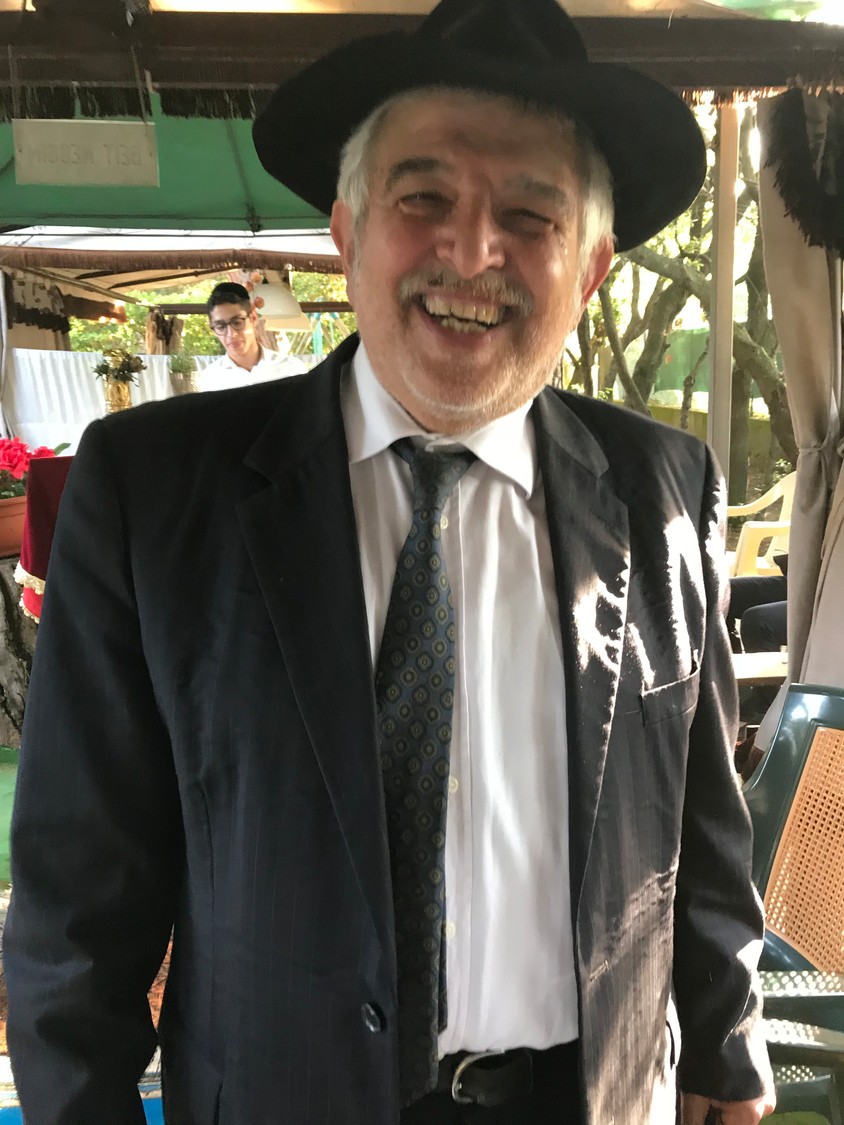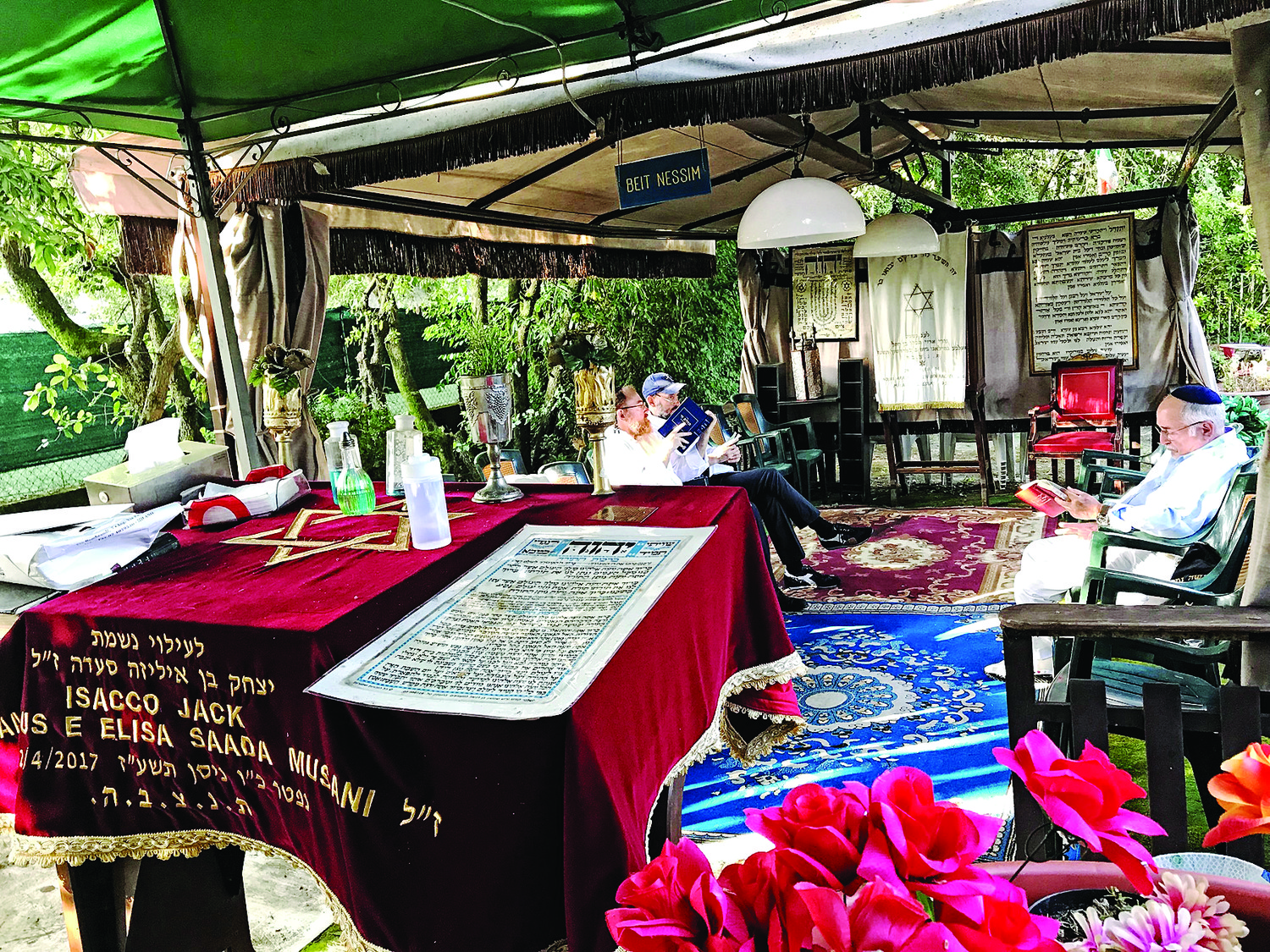A Shabbat on the Italian coast
FORTE DEI MARMI, ITALY – Shabbat shalom from this gorgeous beach town on the Tuscan coast near Pisa and Carrara.
Yes, in this upscale resort in this heavily Catholic country, there is a Sephardic Orthodox summer synagogue. On a Friday evening last month, I was privileged to attend a service, and stay for a delicious buffet supper of groaning proportions.
The synagogue is a cluster of open-sided tents or awnings, surrounded by soaring maritime pine trees in the garden of a home owned by retired businessman Charles Metta, who is in his 70s. Well, it’s his, but really, he tells me, “It belongs to God.” When not in Forte dei Marmi, Metta lives in Milan and Tel Aviv.
The synagogue, operating since 1988, is called Beit Nessim (that is, House of Miracles), a name emblazoned in gold on the black yarmulke Metta gave me.
To get to Beit Nessim, head away from the Forte dei Marmi beach clubs that line the sea, past the downtown restaurants, cafes, gelato stores, and tony shops like Prada and Gucci, and make your way up Via XX Settembre toward the jagged mountains that seem graced by snow. Actually it’s marble.
Near the soccer stadium, turn right at Number 34, and there you are.
A few steps onto the grounds, a small blackboard bears a Hebrew greeting: “Blessed are you who come.”
I walked from the nearby hotel where my wife, Elizabeth, and I were staying. Many folks arrived on bicycles, a standard method of transportation in this town of masonry houses, terra cotta roofs and a relaxed pace of life – in our case centered on the sun, sand, surf and pasta entrées at the Bonaccia beach club.
At Beit Nessim, about 35 men, dressed neatly but in most cases jacketless and tieless, attended the service. It was hard to count precisely because they often moved around. I roamed a couple of times to check whether anyone had turned up in the women’s section. No one did, but I was assured women do attend on Saturday mornings.
The synagogue draws on Jews who happen to be vacationing in Forte dei Marmi or passing through. Metta originally lived in Lebanon, leaving behind the devastating civil strife there years ago. Indeed, most of the worshippers have Lebanese or Syrian backgrounds. I met a man who started out in Egypt, is an anesthesiologist in Florence, and makes it to Beit Nessim several times a summer. A man from Brazil was on hand, and sometimes Russians, an increasing presence in Forte dei Marmi, show up.
After preliminary prayers, the gabbai, Alberto Galante, 65, a Milan businessman, took charge of the service. In a black suit, broadbrimmed hat and dark tie, he certainly looked the part, or my idea of the part.
The prayer book was in Hebrew, with instructions or footnotes in Italian. Most daveners seemed almost to know the prayers by heart. There was no sermon. Except for some announcements in Italian at the end, the service was a rapid-fire blur of Hebrew. Occasionally I would recognize a phrase or word, like Lecha Dodi or Aleinu, but most of the service whizzed by me, sometimes loud, sometimes soft, men often swaying or leaning forward.
Occasionally I turned to neighbors to see what page we were on. They were always helpful – and then I’d fall behind again. Someone thoughtfully offered me an English siddur, but I still couldn’t keep track of where we were.
Still, I absorbed the ambience. I sat in a row just outside the main worship area, which, among other things, afforded me an excellent view of the tallit-like fringe that adorned the awning.
At one point in the service, in a moment reminiscent of chanting the blessings over a kiddush cup, Galante, the gabbai, picked up an ornate silver chalice filled with rosemary. He caressed the sprigs, touching them to his face.
Then, a young man circulated with a plastic bottle and offered to squeeze a few drops of cologne into the palms of the congregants. I welcomed it.
Galante told me later that these gestures reflect a belief that you receive a second soul on Shabbat and it needs to be nourished and refreshed.
When the service ended, host Metta urged me to stay on with some other guests and his family – women and children included – for a magnificent outdoor supper presented by his gracious wife, Paola, including individual challahs and a dizzying array of such dishes as hummus, branzino (Mediterranean sea bass), chicken with eggplant, and brisket with rice.
When I finally got up to leave, she told me I would always be welcome to return. “When you need us,” she said, “we’re here.”
M. CHARLES BAKST of Providence, a retired Journal political columnist, is a member of Reform Temple Habonim in Barrington.











